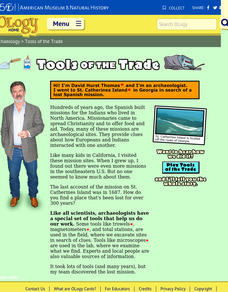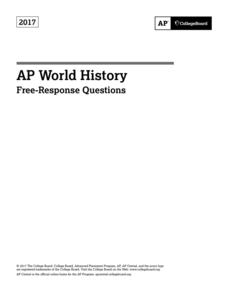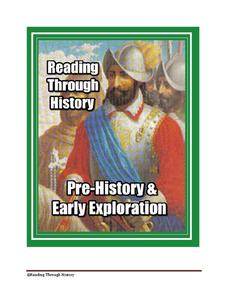Carolina K-12
Early American Settlements
What brought settlers from Europe to North America? By exploring primary sources, such as posters seeking recruits for the new lands, class members take a deeper look at these motivations. To finish, they present their findings to...
National Endowment for the Humanities
Mexican Culture and History through Its National Holidays
Young historians have an opportunity to study the complex history and culture of Mexico by learning about several holidays: The Feast of Our Lady of Guadalupe (Dia de Nuestra Senora de Guadalupe), The Day of the Dead (El Dia de los...
American Museum of Natural History
Tools of the Trade
Archaeologist David Hurst Thomas details his search for a lost Spanish Mission on St. Catherines Island, Georgia. A great way to introduce youngsters to the life of and the tools used by archaeologists.
Stanford University
Native Californians and the Portola Expedition
What was California like before the Spanish came? Class members discover the answer to the question using images of Native Americans and diaries of the early Spanish explorers. Scaffolded activities allow instructors to adapt the...
Stanford University
Expansion of the Inca Empire
If you could write your own history textbook, what would you include? Learners play the role of textbook writers by examining evidence of the Inca Empire. With primary sources from Spanish and indigenous perspectives, as well as images,...
University of California
Impact of the California Missions on Native Americans
While the Spanish claimed to bring civilization to California indigenous peoples, in reality, they also brought violence and forced assimilation to European values. Primary sources, such as the reports of Catholic priests and Europeans...
California State University
Life in the Missions of California
Academics explore the topic of life in California Missions for Native Americas. Class members complete a research activity, respond to writing prompts, and engage in hands-on-activities to learn who lived in the missions and what life...
New York State Education Department
Global History and Geography Examination: August 2011
The Mongols, Spanish, and Ottomans all rewrote history with their conquest and control of empires. Yet, each made its mark differently. Using a variety of secondary and primary sources, pupils consider the similarities and differences...
College Board
2016 AP® United States History Free-Response Questions
The British and Spanish both had footholds in the New World, yet they had different approaches. Scholars explore the dynamics, along with the reasons behind immigration to the United States and business practices of the Gilded Age in a...
College Board
2018 AP® United States History Free-Response Questions
Learners explore the the Age of Imperialism using primary sources and an authentic College Board documents-based question. Other prompts explore the economic changes brought about by the American Civil War, technology, mercantilism, and...
College Board
2017 AP® United States History Free-Response Questions
Were unfair taxes really the cause of the American Revolution? Learners explore the complicated historiography behind the revolutionary period using authentic College Board prompts. The free-response questions from the exam feature...
Reading Through History
Early History and Exploration Unit
We all know about Christopher Columbus, but who else explored the Americas, and specifically, the future United States of America? Learners find out these answers and more in a resource that includes four different reading sections,...
University of Florida
Sailing to St. Augustine
Using a Florida map from 1597, young explorers consider the physical characteristics they would need in a site for a new colony and the resources they would need to survive. After selecting a site, class members research to discover the...
Channel Islands Film
Once Upon a Time (Sa Hi Pa Ca): Lesson Plan 3
What was the most significant tool used by the Chumash? How did the environment make the tool possible? What group behaviors allowed the Chumash be be successful for thousands of years? After watching West of the West's documentary Once...
Channel Islands Film
Once Upon A Time (Saxipak’a): Lesson Plan 1
As part of a study of the history of the Chumash on California's Channel Island chain, class members view the documentary Once Upon a Time, respond to discussion questions, and create a timeline for the different waves of migration.
Student Handouts
Christopher Columbus Workbook
Youngsters gain ample reading comprehension practice while studying the history of Christopher Columbus with this great workbook! It includes word puzzles and comprehension checks of multiple assessment styles, including multiple choice,...
A&E Television
History.com: Why Isn't Puerto Rico a State?
Located about a thousand miles southeast of Florida, Puerto Rico is a Caribbean archipelago with a complex colonial history and political status. As a territory of the United States, Puerto Rico's 3.2 million residents are U.S. citizens....
Khan Academy
Khan Academy: Guaman Poma and the First New Chronicle and Good Government
This letter written by Guaman Poma is the most famous manuscript from South America dated to this time period in part because it is so comprehensive and long, but also because of its many illustrations. View pictures of the illustrations...



















